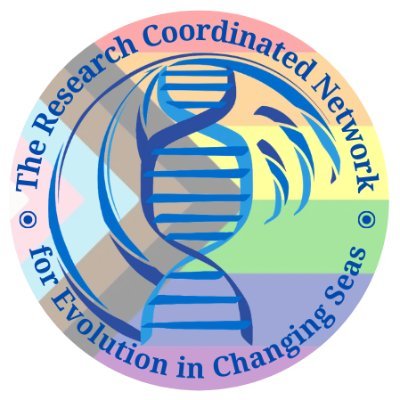 ©2020 Biological and Chemical Oceanography Data Management Office.
©2020 Biological and Chemical Oceanography Data Management Office.Funded by the U.S. National Science Foundation
NSF abstract:
How marine species will react to changing environment and climate is not well understood. While the interaction between oceanographic and ecological processes has yielded considerable insight into the ecology of marine species, the evolutionary responses of marine species are not well integrated into this framework. This project research coordinated network on "Evolution in Changing Seas" (ECSRCN), will bring marine scientists together with evolutionary biologists having expertise in population genetics, eco-evolutionary dynamics, and phylogenetics to better understand and predict the evolutionary responses of marine species to climate stressors. ECS-RCN will increase the impact of evolutionary studies in marine systems through increased collaboration among scientists from diverse fields. Furthermore, the empirical robustness of these studies will also be improved through the development of standards for experimental design and statistical analysis, especially for genomics data analysis. ECS-RCN will build a diverse network through a dedicated workshop for early-career participants, by advertising with diversity groups, and by dedicating funds to increase diversity. This project will support one postdoctoral researcher who will play a key role in coordinating scientific activities of the network as well as receive interdisciplinary training through network activities, strongly positioning them to become a leader in the field. ECS-RCN will also build the foundation for a lasting network through establishment of a listserv, open access to publications, development of a website, and development of teaching modules for undergraduate and graduate curriculum.
Specifically, ECS-RCN will consider how coupling between oceanographic and evolutionary processes shape adaptive and plastic responses to climate change, from the fundamental level of genomes scaled up to entire populations. Under this theme, the objectives of ECS-RCN are to synthesize the current state of knowledge, to prioritize lines of inquiry that will advance knowledge in marine and evolutionary biology, to determine the appropriate experimental designs and statistical approaches for robustly testing these lines of inquiry (including genomics approaches), and to build a foundation for a diverse and lasting network. These goals will be realized over the course of 3 years, starting with a Synthesis Workshop in Year 1 where working groups will be established, followed by working group meetings and formation of a Genomics Subcommittee in Year 2, and ending with an Integration and Training Workshop aimed at early career scientists in Year 3. To promote synthesis and self-organization at workshops, the workshops will employ the Open Space format. ECS-RCN will promote evolutionary thinking in biological oceanography and integrate unique aspects of marine life-histories into evolutionary principles. ECS-RCN will also advance knowledge in both marine and evolutionary biology through synthesis and the development of frameworks for merging genomics and ecology. The activities will provide novel insights into pressing questions in both marine and evolutionary ecology, such as: what drives geographic patterns of local (mal)adaptation and plasticity?; what are the mechanisms that generate adaptive vs. nonadaptive plasticity?; what is the role of genotype dependent dispersal in adaptation?; what are the genetic constraints on adaptation of function-valued traits to climate change?; and how do epigenetic modifications act as a mediator between adaptation and plasticity? Ultimately, the RCN aims to develop a quantitative understanding of the relative importance of ecological versus evolutionary responses to climate change.
This award reflects NSF's statutory mission and has been deemed worthy of support through evaluation using the Foundation's intellectual merit and broader impacts review criteria.
| Dataset | Latest Version Date | Current State |
|---|---|---|
| Model code and output for a comparison of methods for meta-analysis investigating covariance between genetic and environmental (CovGE) effects in phenotypic results | 2024-08-06 | Final no updates expected |
| Lighting pathways to success in STEM: A virtual Lab Meeting Program (LaMP) mutually benefits mentees and host labs | 2024-05-22 | Final no updates expected |
| Results from a meta-analysis investigating covariance between genetic and environmental (CovGE) effects in phenotypic results in published literature | 2022-10-14 | Final no updates expected |
| Results using simulated data used to conduct power analyses | 2022-10-14 | Final no updates expected |
| Metadata for studies from meta-analysis investigating covariance between genetic and environmental (CovGE) effects in phenotypic results | 2022-08-09 | Final no updates expected |

Principal Investigator: Katie Lotterhos
Northeastern University
Co-Principal Investigator: Daniel Bolnick
University of Connecticut (UConn)
Co-Principal Investigator: Joanna Kelley
Washington State University
Co-Principal Investigator: Morgan Kelly
Louisiana State University (LSU)
Co-Principal Investigator: Geoffrey C. Trussell
Northeastern University
Contact: Katie Lotterhos
Northeastern University
DMP_OCE-1764316_Lotterhos_etal.pdf (256.98 KB)
03/30/2022